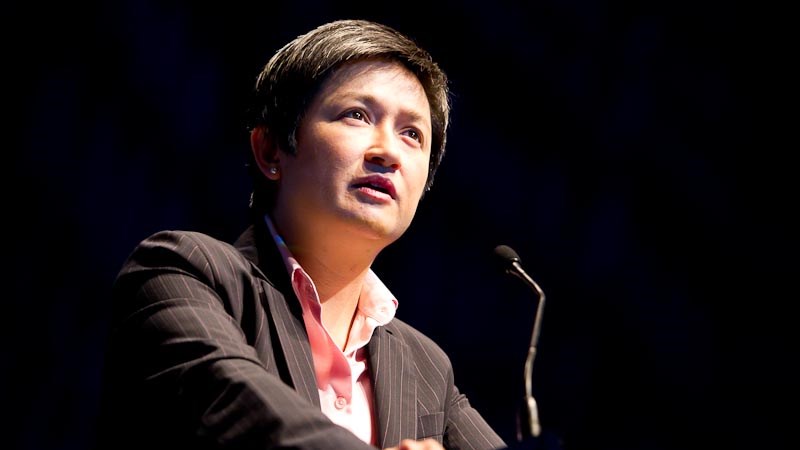Recent Opposition statements on China
August 28 2017

In July the Australia-China Relations Institute (ACRI) reported on an apparent tilt in the China policy of Canberra, reflected in speeches by Prime Minister Malcolm Turnbull and Foreign Minister Julie Bishop (see ACRI fact sheet ‘Australia’s tilt on China).[1] Recently, however, the opposition Labor Party appears to be differentiating itself on China policy. This is reflected in three recent speeches by Shadow Minister for Foreign Affairs Penny Wong.
In a speech to the Australian National University on August 8 2017, Senator Wong stated that Australia’s relationship with China is ‘drifting’ due to a lack of ‘any kind of narrative’.[2]
Senator Wong stated that Foreign Minister Julie Bishop, in her March 13 IISS Fullerton Lecture in Singapore, had demonstrated ‘nostalgia for a world that no longer exists – if it ever did.’[3] In this speech Minister Bishop had called on China to adopt democratic institutions and had called on the US to balance China’s rise by expanding its role in the Indo-Pacific region.[4]
Senator Wong articulated the need for Australia to adopt ‘a China policy that begins with what China actually is, rather than through the lens of risk management.’[5]
She pointed out that ‘[i]t’s not just China and India who argue for new and different rules’. She cited the US’ move toward isolationism and protectionism, Brexit and populist movements in France and Germany.[6]
In the same speech Senator Wong touched on how the Labor Party proposed to approach China's Belt and Road Initiative (BRI). She appeared to be advocating cautious engagement:[7]
[W]e need a policy that looks at the Belt and Road Initiative with an eye to identifying points of mutual interest and complementarity rather than reflexive negativity. We should be prepared to look at individual initiatives under the BRI and, where determined on a case by case basis, pursue those that accord with our national interests.
This builds on comments on the BRI she made in May this year:[8]
China’s Belt and Road Initiative provides valuable opportunities for bilateral and multilateral cooperation. These have to be realised case by case to ensure mutual benefits are delivered…Our reluctance to join the Asian Infrastructure Investment Bank was timorous and self-defeating. We need to display much greater confidence in harnessing the opportunities of the BRI.
Shadow Minister for Defence Richard Marles has also lent support to a case-by-case approach with respect to the BRI:[9]
Certainly it’s not about rejecting China’s initiative out of hand. That makes no sense at all. There are going to be important infrastructure projects and desire from China to invest in them, which may well be in our national interest that we should ultimately support…So we can walk down this path, it needs to be done with caution and we need to be examining these things on a case-by-case basis. But I’m sure there are many projects that we will want to be a part of.
On July 6 2017 Australian Deputy Prime Minister Barnaby Joyce had remarked that the Australian Government would have ‘sympathy’ for US trade sanctions against China with respect to a lack of action against North Korea. This appeared to be a stumble by the Deputy Prime Minister but Shadow Minister for Trade and Investment Jason Clare pointed out that:[10]
[E]ngaging in a tit for tat trade conflict with China would devastate the Australian economy, Australian jobs and Australian living standards.
Imposing trade sanctions on China would devastate Australian farmers. Agricultural trade with China is worth about $10 billion to Australia.
At a time of heightened regional and global instability Australia needs to work with other countries in our region, including China.
Deputy Prime Minister Joyce’s statement was subsequently clarified by Foreign Minister Bishop who said Australia had ‘no plans’ to impose such sanctions.[11]
In a speech to the Australian Institute of International Affairs on November 21 2016 Senator Wong stated a common interest between Australia and the US is ‘ensuring China is a constructive participant in the international order’.[12]
In a third important speech touching on China at the Lowy Institute for International Policy on July 6 2017, Senator Wong said that Australia’s ‘ability to work with…regional neighbours to expand our shared interests while respecting the neutrality of our ASEAN partners would be an expression of our diplomacy that could actually assist China and the US develop a cooperative relationship in the Asia-Pacific region’.[13]
On the East China Sea and the South China Sea, Senator Wong on May 25 this year declined to commit the Labor Party to supporting a stepped-up military role for Australia. In response to US Senator John McCain’s statement that Australia could play a key role in achieving ‘peace through strength’ with the US in the disputed waters,[14] Senator Wong said:[15]
We want continued constructive US engagement in this region and we want a constructive relationship with China.
Shadow Defence Minister Richard Marles has previously called for patrols [16] but, like the Federal Government, has avoided language about entering the 12 nautical mile radius of Chinese-controlled territory. He has placed emphasis on Australian interest being related to the United Nations Convention on the Law of the Sea.
This fact sheet was prepared by Elena Collinson, Senior Project and Research Officer, and Simone van Nieuwenhuizen, Project and Research Support Officer, Australia-China Relations Institute, University of Technology Sydney.
Sources:
[1] See Elena Collinson, ‘Australia’s tilt on China’, fact sheet, Australia-China Relations Institute, University of Technology Sydney, July 4 2017 <http://www.australiachinarelations.org/content/australias-tilt-china>.
[2] Penny Wong, ‘Looking forward – looking back: Australia and the Asian century’, Address to the Australia 360 Conference, Australian National University, Canberra, August 8 2017 <https://www.pennywong.com.au/speeches/looking-forward-looking-back-australia-and-the-asian-century-address-to-the-australia-360-conference-canberra/>.
[3] Ibid.
[4] Julie Bishop, ‘Change and uncertainty in the Indo-Pacific: Strategic challenges and opportunities’, 28th IISS Fullerton Lecture, Singapore, March 13 2017 <http://foreignminister.gov.au/speeches/Pages/2017/jb_sp_170313a.aspx>.
[5] Penny Wong, ‘Looking forward – looking back: Australia and the Asian century’, Address to the Australia 360 Conference, Australian National University, Canberra, August 8 2017 <https://www.pennywong.com.au/speeches/looking-forward-looking-back-australia-and-the-asian-century-address-to-the-australia-360-conference-canberra/>.
[6] Ibid.
[7] Ibid.
[8] Penny Wong, ‘This is hardly the time to be timid in our region’, The Australian, May 2 2017 <http://www.theaustralian.com.au/opinion/this-is-hardly-the-time-to-be-timid-in-our-region/news-story/20c59b8cb4780de57b5b18bd7215ee37>.
[9] Peter van Onselen and Paul Kelly, Interview with Richard Marles, Sunday Agenda Sky News, May 28 2017 <http://parlinfo.aph.gov.au/parlInfo/search/display/display.w3p;query=Id%3A%22media%2Fpressrel%2F5305269%22>.
[10] Jason Clare, ‘Turnbull and Bishop must clarify on China’, media release, July 6 2017 <http://www.jasonclare.com.au/media/portfolio-media-releases/3238-turnbull-and-bishop-must-clarify-on-china>.
[11] Primrose Riordan, ‘Australia has “no plans” for China sanctions, Bishop says’, The Australian, July 7 2017 <http://www.theaustralian.com.au/national-affairs/foreign-affairs/austral....
[12] Penny Wong, ‘Labor’s foreign policy framework’, speech, Australian Institute of International Affairs, Canberra, November 21 2016 <https://www.pennywong.com.au/speeches/labors-foreign-policy-framework-australian-institute-of-international-affairs-canberra/>.
[13] Penny Wong, ‘Australia’s national interests in a time of disruption’, speech, Lowy Institute, Sydney, July 6 2017 <https://www.pennywong.com.au/speeches/australias-national-interests-in-a-time-of-disruption-lowy-institute-sydney/>.
[14] Cameron Stewart, ‘Trump plan to keep China in check’, The Australian, May 25 2017, <http://www.theaustralian.com.au/news/world/trump-plan-to-keep-china-in-check/news-story/8a109024d7bc2dbcb57fc23229c8e860>.
[15] Penny Wong, Doorstop – Canberra, transcript, May 25 2017 <https://www.pennywong.com.au/transcripts/doorstop-canberra-26/>.
[16] James Massola, ‘Navy should be authorised for freedom of navigation in South China Sea: Marles’, Sydney Morning Herald, October 7 2016 <http://www.smh.com.au/federal-politics/political-news/navy-should-be-aut... Peter van Onselen and Paul Kelly, Interview with Richard Marles, Sunday Agenda Sky News, May 28 2017 <http://parlinfo.aph.gov.au/parlInfo/search/display/display.w3p;query=Id%3A%22media%2Fpressrel%2F5305269%22>.


